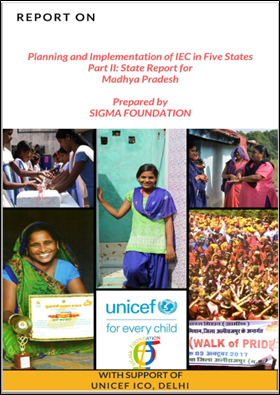Report on Planning and Implementation of IEC/SBCC Activities in Madhya Pradesh
Contributed By: Dr. M. N. Roy, Dr. Debasri Mukherjee, Ganesh Choudhary, Er. Sohini Tarafdar, Nilanjana Mukherjee, Poulami BasuMDWS requested UNICEF India Country Office (ICO) to study the status of preparation and implementation of IEC/SBCC plans of different states for the year 2018-19. UNICEF ICO agreed to support such assessment in Madhya Pradesh. UNICEF ICO partnered with SIGMA Foundation, a ‘Not for Profit’ organization to take up the study.
The approach adopted for the study involved analysis of the state and district IEC/SBCC plans for the year 2018-19 to review the plans and to assess various aspects of the processes of planning followed and implementation through field studies. Information was collected from different key officials through IDIs and various sections of the community through FGDs. 2 districts (Alirajpur and Chhatarpur) were selected in consultation with the state governments and UNICEF state office keeping in mind the diversity within the state. Further, Alirajpur Block from Alirajpur District and Nougaon Block from Chhatarpur District were selected to collect the qualitative information.
The report was shared with UNICEF ICO. It was found that the state plan was formulated with a vision to reduce the disease burden of the rural population of the state by achieving a cleaner environment and the adoption of hygienic practices. The plan focused on communications related to ODF sustainability (ODF-S) as well as activities for improving environmental cleanliness and personal hygiene, which are categorized as ODF Plus. The thrust areas were safe disposal of human and child faeces, improved personal hygiene, safe handling of drinking water, and management of solid and liquid waste. The IEC/SBCC state plan for 2018-19 was to also address the existing inequality in access and usage of sanitary facilities. Different tools including mass media, social media, print media, mid media, community triggering (CAS), orientation workshop, development of scripts and songs etc. were used as tools of communication for successful IEC/SBCC campaigns. For advocacy, workshops were the main channel of communication apart from sharing documents on progress/ issues on which support of partners/influencers etc. was needed. All the designed tools had specific focus and target groups.

